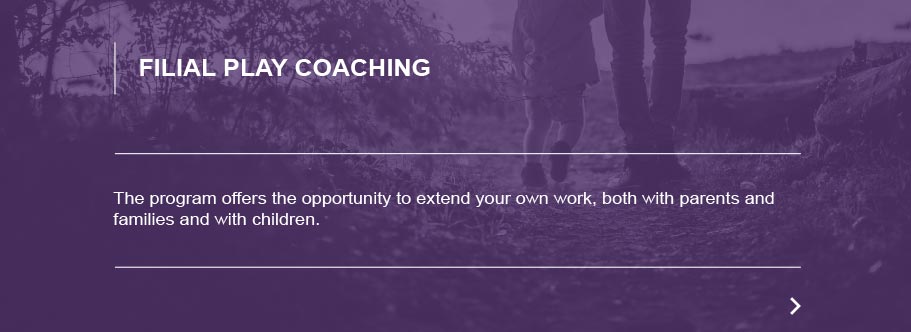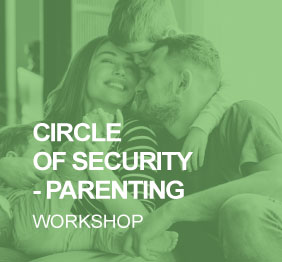POST QUALIFYING CERTIFICATE IN FILIAL PLAY COACHING

The training program in Filial play coaching is clinically accredited by PTUK and PTI. It is based on the quality standards of PTI, which considers Filial Play Coaching to be a recognized method of joint working with parents and children.
The program offers the opportunity to extend your own work, both with parents and families and with children.
By completing 40 hours of satisfactory practice, with all the requirements and tasks for Filial Play Coaching, one receives the PTI / PTUK Post Qualifying Certificate in Filial Play Coaching. In the United Kingdom this program is recognized for its academic quality by Leeds Beckett University.
Participants who successfully complete the program will be added to the PTUK / PTI directory (see www.playtherapyregister.org.uk) with the title Filial Coach.
The program is addressed to:
Counselors, Psychotherapists, Clinical Psychologists, Family Therapists, Health Visitors, Kindergarten Teachers, Teachers, Nurses, Play Therapists, Social Workers, Adoption or Adoption Officers, etc.
The program takes place in seven days and is divided into two parts. In the first three days, there is training in non-directive play. Certified play therapists who have at least 100 hours of supervised clinical experience with children using non-directive play may attend only the second part of the four days. This second part of the program can also be attended by all those who are already being trained at the certificate level by Play Therapy Greece.
Location and Duration
he Filial course will be held at Play Therapy Greece in Athens:
• seven (7) days for new participants or
• four (4) days for those who have completed or are attending the PTGR or PTI program, plus one day of follow-up.
Program dates:
13 February 2019 – 15 February 2019 (attendance required for young students).
16 February 2019 – 19 February 2019 (The next 4 days for those who have completed the Certificate in Therapeutic Play Skills program or the first 3 days)
Follow up Day – For those who have already completed the 7 or 4 day program.
Date: To be determined during the program.
Information – Reservations – Registration
Play Therapy Greece,
+30 210 7796100, +30 6985577627,
Email: playtherapygreece@gmail.com
Objectives of the educational program
This training program in filial play coaching is designed to:
• Enrich your career and professional skills
• Increase your satisfaction with your work with parents, families and children
• Provide you with the skills to train parents to improve their relationships with their children
• Give you the skills to help parents to help their children develop emotional skills.
• To give you skills to help parents comfort their children with mild to moderate social, emotional issues and behavioral problems
• To enable your personal development
• To provide you with the skills needed to teach parents filial play skills required by the Profession Structure Model, as defined by the PTI.
Program summary
A new approach to Improving Parent /child-relationships.
Some parents have difficulty establishing and maintaining mutually satisfying relationships with their children. Parents can and should play an important role in alleviating their children’s social, emotional, and behavioral problems. It is not practical and would not be ethical for parents to perform Play Therapy or Filial Therapy on their own children. However, it is necessary and highly desirable that they be able to use child-centered, non-directive play as part of their parenting activities.
The term child-centered play is used to distinguish and differentiate these activities from therapeutic play as performed by appropriately trained therapists. The goal of this training program is to train participants in the assessment tools, teaching techniques, and skills in non-directive play that they will need to develop and apply in their own work environment with parents and their children.
The program focuses on successfully teaching these basic skills that parents from diverse backgrounds will use in their varied daily lives. Other programs focus primarily on non-directive play skills, whereas this PTI program focuses on how these can be acquired and used by parents to help with problems that need to be overcome.
In addition, this program is designed for experienced therapeutic play professionals – those who have completed a PTI program or equivalent course with a Certificate in Therapeutic Play Skills. In this case, the focus is on evaluating and applying teaching methods to transfer filial play skills to parents.
Learning objectives
The learning objectives are based on the skills required by the PTI for training as a Certified Filial Play Coach / mentor. These are listed below:
The required skills are divided into three main skill groups:
• Using and teaching the effective use of non-directive play.
• Coaching skills
• Assessment, measurement and preparation
Participants who successfully complete the training program should be able to:
(from the PTI skills list).
471 – Carry out the assessment of parents and children being considered for filial play using the ASQ:SE and/or the Goodman’s SDQ, a Hopes and Expectations questionnaire and a Capability/Commitment measure.
472 – Recognize when either parent or child is not currently suitable for filial play and refer on appropriately.
474 – Monitor the parents’ filial play sessions using an appropriate model, providing advice, guidance and support.
475 – Advise and instruct the parents upon how to make notes on home play sessions, using a log, so that they are suitable for use during the coaching sessions.
476 – Plan, equip and manage the equipment, materials and toys in a suitable room for the training and coaching of parents.
477 – Advise and instruct the parents upon acquiring and using appropriate equipment, materials and toys during their home play sessions according to their circumstances.
478 – Teach the parents the importance of play, the main types of play and their purpose so that they can achieve a suitable balance with their children.
479 – Ensure that the parents understand the objectives of filial play.
480 – Ensure that the parents know how to structure a filial play session.
481 – Ensure that the parents know how to accept the behaviour of the child during a filial play session.
482 – Ensure that the parents know how to focus on the child during a filial play session.
483 – Ensure that the parents know how to let the child lead throughout a filial play session.
484 – Ensure that the parents know how to reflect upon the child’s nonverbal behaviour during a filial play session.
485 – Ensure that the parents know how to reflect upon the child’s verbalisations during a filial play session.
486 – Ensure that the parents know how to reflect upon the child’s expressed emotions during a filial play session.
487 – Ensure that the parents know how to use encouragement and praise during a filial play session.
488 – Ensure that the parents set, manage and maintain appropriate boundaries during a filial play session.
489 – Ensure that the parents know and put into practice the principles of non-directive play.
490 – Ensure that the parents recognize and deal appropriately with any sibling issues that arise as a result of filial play.
491 – Demonstrate the use and applicability of the main non-directive play media: art media, music, movement, sand tray (or substitute), storytelling, puppets clearly indicating which are appropriate for use at home and those that may be used in the therapist’s play room.
492 – Carry out regular progress reviews as appropriate to each family’s circumstances.
493 – Carry out appropriate procedures at the end of the formal training of the parent/carers programme.
494 – Integrate the use of filial play with play therapy if this is being used concurrently or after play therapy has finished.
495 – Consult with the parents, children and others involved on appropriate follow up and continuing support services.
496 – Brief other involved organizations and colleagues upon the purpose and methods of filial therapy.
497 – Maintain suitable records of progress and carry out quality management of filial play work.
498 – Apply an ethical framework, confidentiality and the requisite child protection procedures to all filial play work.
Note: This training program teaches the relevant coaching skills for filial play. The difference between coaching and mentoring is explained in detail but the program does not claim to teach mentoring skills.
Program structure
The sequence and content of each day varies according to the needs of the participants.
Module: B1 Course Introduction Choosing an appropriate filial play model – Assessment and setting up
Day 1: Content
• Course objectives and introduction; course and practice requirements.
• Historical development of filial play. The different filial play and filial therapy models – pros and cons.
• The differences between coaching mentoring and counseling. The seven layers of filial play coaching and mentoring dialogue. Identifying the appropriate developmental space.
• Coaching theory.
• The assessment process and tools: ASQ: SE, SDQ, child development, parent / child interaction, parent capability and commitment.
Module: B2 Working With the Parents – Coaching Skills
Day 2 – 3: Content
• Planning the training sessions. revision of non-directive play skills from a parent coaching perspective: setting boundaries, focusing on the child, letting the child lead, appropriate reflections.
• Helping the parents to set up. Suitable toys and materials. Completing and using the parents’ log.
• Applying coaching skills to filial play
Module 3: B3 Bringing it all together
Day 4: Content
• Further coaching practice.
• Dealing with specific problems and parents’ questions; further coaching practice; long term support of families.
Program language: English
Educational Methods
Participants will learn the roles and responsibilities of a Filial Play Coach / Mentor by working with other program participants. There will be theoretical teaching, but as little standard theoretical teaching as necessary.
Learning will be experiential and collaborative in pairs, groups, role-play and case presentations. Working through practice, working with parents and their children, will provide new educational opportunities and consolidation of knowledge emerging from experiential exercises during the program. The work will be the subject of discussions during the following module (follow-up day).
Instructor
Karen O’Neil
Karen O’Neill is a PTUK accredited Play Therapist and senior Certified Clinical Supervisor. She also has an MA in Practice based play therapy. In addition, she is a BACP senior accredited Counsellor, with over 14 years’ experience. She has a specialist interest in attachment and trauma and has trained in Attachment Focused Therapies including Theraplay®, Filial Coaching, Dyadic Developmental Psychotherapy as-well as EMDR and Somatic Trauma Therapy. Her private practice is in Essex, UK, where she offers play therapy, psychotherapy, counselling, clinical supervision and consultancy work. She has a wealth of experience using the creative arts in a therapeutic setting and has provided a range of bespoke training to a number of organisations including Health, Education, Local Authorities, Counselling Services. She is a Senior Course Director with the Academy of Play and Child Psychotherapy (APAC) and Associate Tutor with Leeds Beckett University and has for the past 10 years delivered training on a range of courses for APAC accredited by PTUK/PTI in the UK and overseas.






